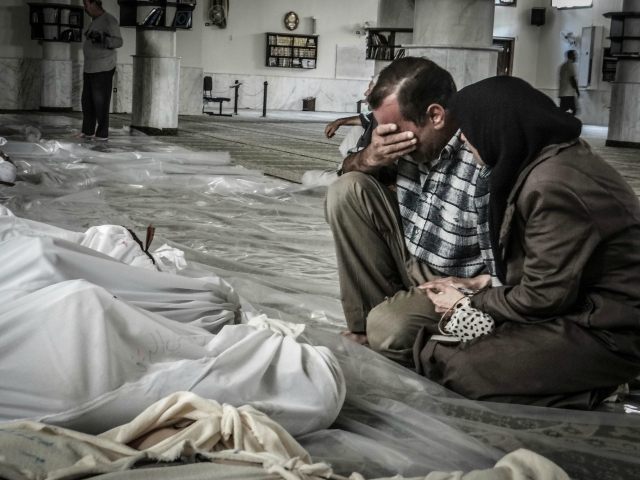The use of chemical weapons in Syria, namely chlorine and mustard gas, is becoming routine, lamented the U.S. representative of a United Nations-backed chemical weapons watchdog.
Activists on the ground in Raqqa have reported that the banned substance known as white phosphorus (WP) is also being used as a weapon in airstrikes against the Islamic State (ISIS/ISIL).
Under international law, the only accepted use of the highly flammable substance, which causes horrific burns when it is used on people, is to light up the battlefield and provide cover for ground troops, reports The Independent.
The use of WP in densely populated areas such as Raqqa, ISIS’s de facto capital, or when directly targeted at infantry is prohibited because it is extremely toxic and can burn through skin and bone, adds the report.
Remarks obtained by Reuters revealed that U.S. representative Rafael Foley on Monday told a special session of the UN-backed Organization for the Prohibition of Chemical Weapons (OPCW) that “the sad reality is that chemical weapons use is becoming routine in the Syrian civil war.”
“There is no greater threat at this time to the Convention and the international norm against chemical weapons than the continuing use of such weapons to harm and kill the Syrian people,” added the U.S. representative of OPCW.
Foley’s remarks were prepared for a closed meeting by the 41-country Executive Council of OPCW, held in response to the watchdog discovering that toxic agents, including chlorine and mustard gas, had been used in Syria between March and August of this year.
“In sum, ominously hanging over the entire discussion in the Council is the fundamental question of whether Syria is prepared truly to renounce chemical weapons,” Foley declared.
The OPCW issued a confidential report in late October that provided the first official confirmation of the use of sulfur mustard, or mustard gas, in Syria since the Bashar al-Assad regime agreed to destroy its chemical weapons stockpile two years ago, after a large scale sarin attack killed hundreds of people outside the Syrian capital of Damascus.
“While the OPCW did not specifically say which of the many sides in the war used the chemical, diplomatic sources said it had been used in clashes between Islamic State and rebel fighters in the town of Marea in August, as well as in rebel-held areas under attack by Syrian government forces,” notes Reuters.
“That raised the possibility, diplomatic sources said, that Islamic State had gained the ability to make it themselves, or that it may have come from an undeclared stockpile,” it adds.
The Hague-based OPCW voiced “grave concern” at the continued use of chemical weapons in Syria during Monday’s special meeting.
OPCW representatives also discussed the organization’s investigations into chemical weapons use in Syria.
The watchdog expressed “grave concern regarding the findings… that chemical weapons have once again been used in the Syrian Arab Republic,” the body said in a statement issued Monday, adding that chemical weapons use by anyone “is unacceptable and would violate international law.”
“Those individuals responsible for the use of chemical weapons should be held accountable,” it also said.
None of the parties involved in the four-year Syrian civil war were accused of using toxic arms in the investigative reports issued by OPCW.
Nevertheless, Foley said that “the Syrian regime has continued to use chemical weapons on its own people despite its obligations under the Chemical Weapons Convention.”
Reports have surfaced showing that white phosphorus was used in airstrikes on Raqqa on Nov. 22, according to Raqqa is Being Slaughtered Silently, a network of citizen journalists which represents the primary source for information from inside ISIS’s de facto capital.
“It is thought to be the first reported use of white phosphorus in air strikes on Raqqa, which has been heavily bombed by the Russian and French air forces in the wake of the [Nov. 13] Paris attacks,” reports The Independent.
The targeted areas are reportedly full of civilians.
Witnesses in the rebel-controlled Syrian city of Idlib told The Times on Nov. 13 that dozens of civilians had suffered “horrific injuries” from WP attacks.
In November, the OPCW confirmed with “utmost confidence” that mustard gas was used in Syria during an August battle between rebels and jihadist.
It is “very likely that the effects of sulfur mustard resulted in the death of a baby,” reported the watchdog organization.

COMMENTS
Please let us know if you're having issues with commenting.